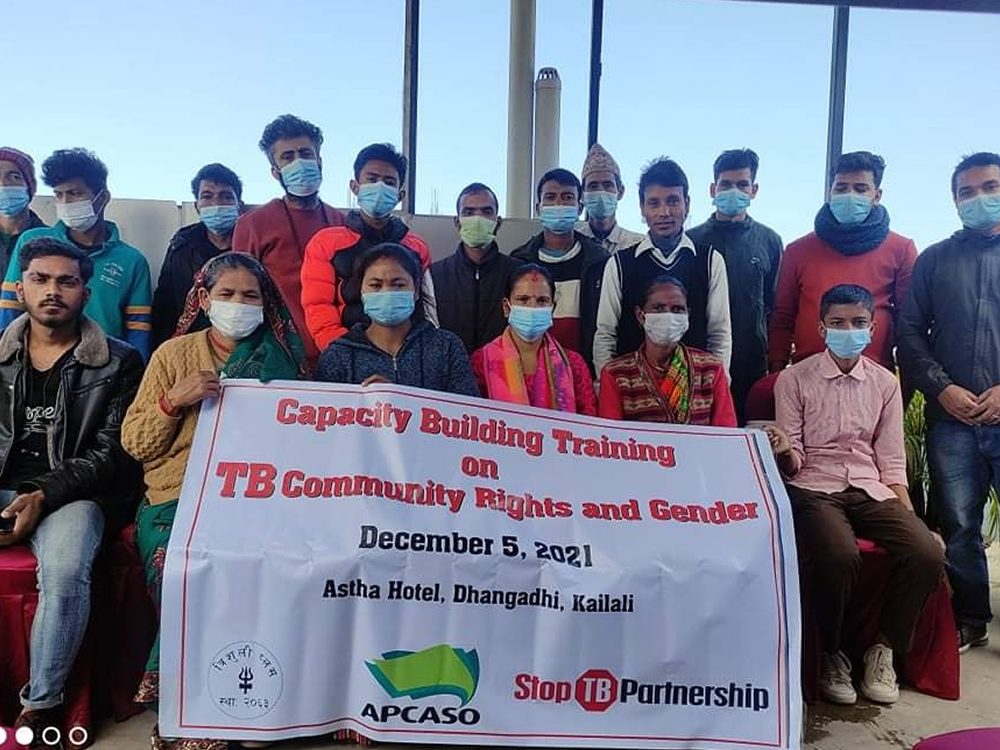आज मिति २०८२ मंसिर १७ गते मङ्गलबार
Our Work Details

Tuberculosis (TB)
1. National TB Program
Trishuli Plus Community Action Group (TPCAG) has been supporting the National Tuberculosis Program (NTP) and National Strategic Plan 2016-2021 as a Sub Recipient of Global Fund/Save the Children International (GF/SCI). It has been implementing different activities of the National TB program for case finding in 5 districts of Sudur Paschim province: Kailali, Kanchanpur, Doti, Dadeldhura, and Achham. The major interventions under this NTP-supported project are sputum courier from non- microscopic center to microscopic center, contact tracing at family members of the index case, childhood TB management, DR case management through DR suspects, DR suspect’s sputum courier and DR index contact tracing, implementation FAST strategy among major hospital, Active case finding among labor migrants and Tuberculosis Prevention Therapy (TBPT) initiation to U5 children identified from contract tracing.
1.1 Sputum Courier
This is an intervention for finding new TB cases findings where the sputum of TB is collected and delivered to a microscopic center through systematic screening and three-layer packaging.
1.2 Contact Tracing
Mandatory Contact tracing is the best recommended intervention to support new TB case finding. Thus, in program districts trained volunteers conduct contact tracing with systematic screening among all adult PBC index (family members) and all types of child cases.
1.3 Childhood TB Management
As per the WHO estimation, there are 11% of child cases among all types of TB cases, however as per the NTP annual report only 5.5 % of child TB cases are reported. Seeing this gap malnourished children/ARI from Health facilities and major hospitals are targeted to screen for TB and access for TB diagnosis. For this purpose, 122 OTC centers and HFs were linked under this intervention to manage childhood TB cases at the community level/HF level; similarly, two major hospitals were linked under this intervention under the project.
1.4 Drug Resistant TB Management
This activity is related to increasing DR Service access and treatment coverage where all DR suspects as per the national guidelines (all retreatment cases, all New PBC & PCD and TB HIV co-infection) are focused through sputum courier and contact tracing.
2. Community Mobilization of TB
Trishuli Plus has formed a community of TB-affected people from different districts throughout the country with the aim of capacity building and empowerment of TB survivors. Different programs are conducted to mobilize the TB survivor group and advocate for the rights of the TB survivor community
2.1 Advocacy on TB, focusing on unity rights and Gender
Trishuli Plus conducts interaction programs to increase interaction among the TB-affected community as well as to capacitate them regarding gender issues and rights.
2.2 Formation of TB Survivor Groups
3. Community, Rights, and Gender (CRG) Assessment of Tuberculosis In Nepal
The TB Community, Rights, and Gender (CRG) Assessment is a qualitative process that prioritizes the experiences and participation of communities affected by TB, including key and vulnerable populations. It is a process that seeks to identify and address barriers to TB prevention, diagnosis, and treatment, as well as promote community participation and human rights in TB programs. It also assesses the significance of human rights, law, and gender in the TB response in partnership with the national TB program and other stakeholders. This assessment also focuses on ensuring that people affected by TB have equal access to quality health services and are not discriminated against based on their gender, ethnicity, or socioeconomic status. In general, the TB CRG assessment is an essential tool to ensure that TB services in Nepal are delivered in a way that meets the needs and rights of all people affected by TB, including every gender, children, key populations, and vulnerable populations.
The CRG assessment was conducted in Nepal for the first time, and the findings from this assessment will help in developing policies, strategies, and interventions to improve TB prevention and control in Nepal. The assessment is focused on the seven themes adapted from the right to health framework. These are accessibility, availability, acceptability, quality, stigma, and discrimination; health-related freedoms (e.g., privacy and confidentiality); barriers among prioritized KVPs; gender-related barriers in the TB response, participation of TB survivors and KVPs; and legal and administrative remedies. Based on these themes, the present situation, gaps, and recommendations are discussed in the report.
